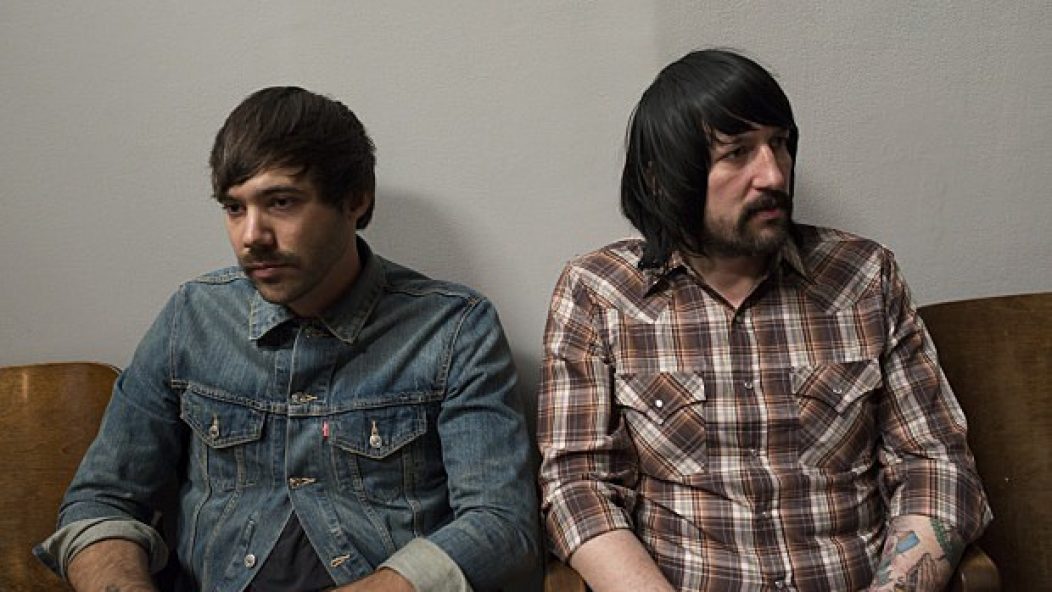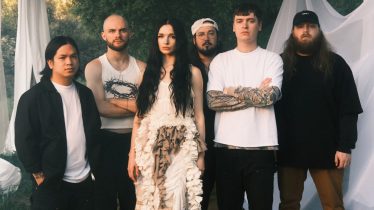
“There was a long process of us resenting each other”—the improbable return of Death From Above 1979
Ten years ago, DEATH FROM ABOVE 1979 made their debut with a beautifully bombastic DIY dance-punk classic titled You’re A Woman, I’m A Machine. Two years later, it was all over for bassist/synth player Jesse F. Keeler and vocalist/drummer Sebastien Grainger. DFA1979 didn’t so much break up as completely implode, with Keeler releasing the following statement online:
“over the last 3 years of touring, sebastien and i had grown apart to such an extent that the only real time we spoke was just before we would play and during interviews. we both changed so much that the people we were by the end of it, probably wouldnt have been friends if they were to meet for the first time again. its a totally normal function of growing up. like how your high school bf/gf that meant so much to you would probably be the last person you would date at 30, ya know? thats where we got to.” [all sic]
Sometimes, however, things work themselves out. After getting back together for some shows in 2011, Death From Above 1979 are about to officially return with a great new album titled The Physical World, out Sept. 9 on Warner Bros. SEBASTIEN GRAINGER was happy to talk about what went wrong a decade ago, and, more importantly, what’s now going right.
INTERVIEW: Mike Usinger
PHOTO: Pamela Littky
You’ve been away for a while. What’s life like now?
Everything is very calm right now, but I know that it’s just the calm before the storm. There’s going to be a lot of action in the next year or so, and I’m happy to just clean the kitchen, dust, clean the car and do all those relaxing things.
Are you excited about returning to action with DFA1979?
I’m excited—really excited. The only dread that I’ve had all year is the weight of not playing. The waiting is hard, because we finished the record what feels like so long ago. The real joy of my life is playing shows, so without that, I’m a bit lost.
Compared to You’re A Woman, I’m A Machine, you seem to be drawing on a wider range of influences on The Physical World—everything from buzzsaw pop to classic British Invasion rock. Do you hear that in the songs?
It’s pretty rare for influences to factor into the songwriting process. But it does on a couple of songs. There’s one song on the record that I’m not going to name—you might be able to guess—where I wrote one part, and left another section open for Jesse to write in. We were working on it and Dave Sardy, the producer, said, “Oh, we’ve gotta keep working on this.” So Jesse went to work on the section that was blank and we essentially wrote a Deep Purple song [Laughs.] I didn’t intend to write a Deep Purple-style riff, and he didn’t intend to write a Deep Purple-style riff, but when we put it together we realized what we had, and we went with it, because Deep Purple were a massive influence on the early stage of the band.
Was branching out stylistically challenging given you’re only a two-piece?
The way that Jesse and I approach things is very simple. Because of the form of the band, pretty much anything goes because there is a very specific sound that Jesse has on his bass rig. That is the hull of the ship. Anything else can go in there. Because we have a limited form, we can venture into different territories stylistically because it’s always going to sound like Death From Above. The ingredients are so basic that it’s like chocolate and flour and butter and eggs. You can make a million different things from those ingredients, but they are all going to taste like delicious chocolate, butter, flour and eggs. So that’s how we approach it, and if that means that some songs are heavier than others, and that we’ve written a ballad accidentally, if that means that we’ve ripped off Sabbath or Deep Purple, or if there’s a weird seventh Beatles harmony in a metal song, it means we’re just trying to do the best things that we can do without being tyrants about style.
Do you sometimes have to hold back?
With the studio environment that we had this time, there was so much stuff around, the amount of restraint we had to show to not put it all on the record was admirable. We were in a playground of beautiful instruments and synthesizers.
Dave Sardy has worked with acts ranging from Oasis to the Walkmen to LCD Soundsystem. Why did you pick him for your producer?
He was Jesse’s choice. The conversation of having a producer wasn’t always around, but when we started talking about one, he was like, “We should get Dave Sardy.” I wasn’t really familiar with his catalog, but there were a few things that really stuck out, where I didn’t even know it was Dave Sardy, but totally got behind what he had done. Like “The Rat” by the Walkmen, which is such a tremendous song. He’s part of the reason that song sounds so great, even though I’m sure the Walkmen would argue in the other direction. [Laughs.] There were a couple of other things that he’d done where I’d listen to it and just go, “Yeah, that totally makes sense.” This is a really selfish motivation, but he’s just so good at making drums and vocals sound really, really great. On our first record—and God bless that record—I was never really happy with the way that certain elements of it were recorded. I thought we could have done better. I think we chose [Sardy] so that he could take what we do and make it sound the way that we think it should.
Can you talk about what went wrong before the breakup?
I don’t wanna speak too long on it, but basically we went through a very intense experience together at a point in our lives where you’re still kind of defining who you are. As those things are happening, your individuality really gets sucked out—when you’re in a band with other people, your personality, at least from the outside, kind of gets homogenized. We were both pretty strong personalities who were literally together all the time. To then be lumped together as this sort of one thing was difficult. That’s the underlying psychology of it. There was a long process of us resenting each other, which happened over the course of years, and we were both looking for a way to get out of it. Creatively, there was nothing going on. We stopped being creative basically two years before we broke up. It was like we made this record [You’re A Woman] and then played it back for two years. The gap between us seemed irreconcilable. It was a tragedy—we had some problems.
When did things get better?
We literally didn’t speak for five years. When the concept of Jesse re-entered my mind, and it wasn’t riddled with all this baggage, all of a sudden it was like, “Oh—that guy.” Then I knew that we could probably make it work. And seemingly he felt the same way. alt








